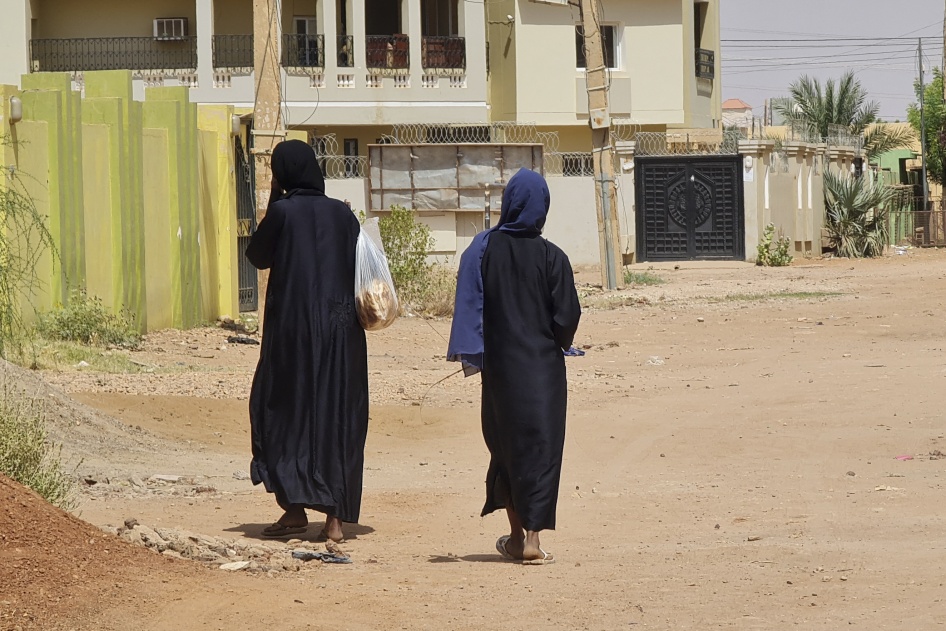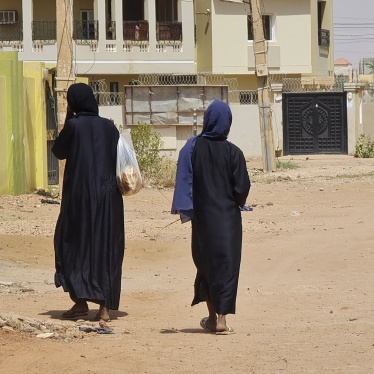- Rapid Support Forces (RSF) in Sudan have committed widespread acts of sexual violence in areas of Khartoum over which they exercise control, acts that constitute war crimes and crimes against humanity.
- Both the RSF and the Sudanese Armed Forces (SAF) have attacked healthcare workers, local responders, and healthcare facilities, which are war crimes.
- The African Union and the United Nations should urgently deploy a civilian protection force, and states should take steps to hold those responsible for sexual violence accountable.
(Nairobi) – Sudan’s warring parties, particularly the Rapid Support Forces (RSF), have committed widespread acts of rape, including gang rape, and forced women and girls into marriages in Khartoum, the country’s capital, since the current conflict’s onset, Human Rights Watch said in a report released today.
The 89-page report, ““Khartoum is Not Safe for Women”: Sexual Violence against Women and Girls in Sudan’s Capital,” documents widespread sexual violence, as well as forced and child marriage during the conflict, in Khartoum and its sister cities. Service providers treating and supporting victims also heard reports from women and girls of being held by the RSF in conditions that could amount to sexual slavery. The research also highlights the devastating health and mental health consequences for survivors and the destructive impact of warring parties’ attacks on health care and the Sudanese Armed Forces’ (SAF) willful blocking of aid.
“The Rapid Support Forces have raped, gang raped, and forced into marriage countless women and girls in residential areas in Sudan’s capital,” said Laetitia Bader, deputy Africa director at Human Rights Watch. “The armed group has terrorized women and girls and both warring parties have blocked them from getting aid and support services, compounding the harm they face and leaving them to feel that nowhere is safe.”
It is of paramount importance to hear directly from sexual violence survivors themselves, their experiences, views, and demands should be heard in a safe and dignified manner. Given restrictions on access to Khartoum, security challenges, lack of services for survivors, and logistical barriers, Human Rights Watch, with a few exceptions, for this report interviewed 42 health care providers, social workers, counsellors, lawyers, and local responders in the emergency response rooms that they have established in Khartoum between September 2023 and February 2024.
Eighteen of the healthcare providers had provided direct medical care or psychosocial support to survivors of sexual violence, or managed individual incidents. They said they had cared for a total of 262 survivors of sexual violence from ages 9 through 60 between the conflict’s onset in April 2023 and February 2024.
“I have slept with a knife under my pillow for months in fear from the raids that lead to rape by RSF,” a 20-year-old woman living in an area controlled by the RSF told Human Rights Watch in early 2024. “Since this war started, it is not safe anymore to be a woman living in Khartoum under RSF.”
The physical, emotional, social, and psychological scars left on the survivors are immense, Human Rights Watch found. Healthcare workers encountered survivors seeking assistance for debilitating physical injuries they experienced during rapes and gang rapes. At least four of the women died as a result. Many survivors who sought to terminate pregnancies resulting from rape faced significant barriers to abortion care. Survivors described or showed symptoms consistent with post-traumatic stress and depression, including suicidal thoughts, anxiety, fear, and sleeplessness.
“I spoke to a survivor who was raped and had just discovered she was three months pregnant,” a psychiatrist said. “She was clearly traumatized and shivering, afraid of how her family would react. She said to me, ‘If they discover my situation, they will kill me.’”
Survivors told the medical providers that they were raped by as many as five RSF fighters. The RSF have also abducted women and girls and confined them in homes and other facilities they occupied in Khartoum, Bahri, and Omdurman, subjecting them to sexual violence and other abuse. RSF members have sometimes sexually assaulted women and girls in front of their family members. The RSF also forced women and girls into marriages.
Fewer cases were attributed to the Sudanese Armed Forces members, but an uptick in cases was reported after SAF took control of Omdurman in early 2024. Men and boys have also been raped, including in detention.
Both warring parties have blocked survivors’ access to critical and comprehensive emergency health care, Human Rights Watch found.
SAF has willfully restricted humanitarian supplies, including medical supplies, and aid workers’ access, imposing a de facto blockade on medical supplies entering RSF-controlled areas of Khartoum since at least October 2023. The RSF have pillaged medical supplies and occupied medical facilities.
Local responders have been compelled to play the leading role in responding to sexual violence. They are paying a heavy price, as both warring parties have intimidated, arbitrarily detained and attacked doctors, nurses, and emergency care volunteers, including because they support rape survivors. In several instances, RSF members committed sexual violence against the service providers, they said.
Conflict-related sexual violence is a war crime. As is the case with forced marriage, when sexual violence is committed as part of a widespread or systematic attack on a civilian population, as is happening in Sudan, it may also be investigated and prosecuted as a crime against humanity, Human Rights Watch said.
The willful obstruction or arbitrary restriction of humanitarian aid also violates international humanitarian law, and pillaging as well as attacks targeted at civilians, including health care workers and first responders, constitute war crimes. Intentionally directing attacks against humanitarian assistance operations, including personnel, premises, and vehicles, is also a discrete war crime prosecutable under the statute of the International Criminal Court (ICC).
Neither warring party has taken meaningful steps to prevent its forces from committing rape or attacking health care, nor to independently and transparently investigate crimes committed by their forces, Human Rights Watch found. On July 23, the RSF spokesperson wrote to Human Rights Watch rejecting claims that the RSF occupies any hospitals or medical centers in the three cities of Khartoum State. He did not provide evidence that it has carried out effective investigations into allegations of sexual violence by its forces, far less hold any to account.
The African Union and the United Nations should immediately work together to deploy a new mission to protect civilians in Sudan, including preventing sexual and gender-based violence, supporting delivery of comprehensive services to all survivors, and documenting conflict-related sexual violence. The mission should have a mandate and capacity to monitor the obstruction of, and facilitate access to, humanitarian assistance.
International donors need to urgently increase political and financial support to local responders. Countries should work together to impose targeted sanctions on commanders responsible for sexual violence, and attacks on healthcare workers and local responders. UN member states, particularly from the region, should continue to support international investigations into these crimes, including by the Independent International Fact-Finding Mission for Sudan. The United Nations should prioritize ensuring that it rebuilds capacity to respond to conflict related sexual violence across its system.
“Women, men, and children at imminent risk of abuses or who have survived rape in Khartoum and beyond should know that the world is willing to protect them, and guarantee their access to support services and justice,” Bader said. “The United Nations and African Union need to mobilize this protection and states should hold to account those responsible for ongoing sexual violence, attacks on local responders, health facilities, and the blocking of aid.”









